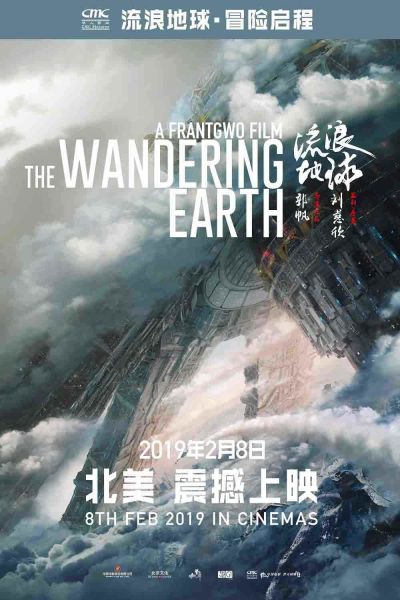March of the Volunteers
The Wandering Earth
By Frant Gwo

8 May, 2019
2019’s The Wandering Earth (Chinese: 流浪地球) is a 2019 Chinese film adaptation of Liu Cixin’s novella of the same name (which I have not read). It is directed by Frant Gwo and stars Qu Chuxiao, Li Guangjie, Ng Man-tat, Zhao Jinmai, Wu Jing, and Qu Jingjing. A major hit in China, it was stealth-released on Netflix on May 6, 2019.
Bad news for Earth! The Sun is transitioning from a main sequence star to a red giant five billion years ahead of schedule. Life within the Solar System will soon become impossible.
There’s an alternative to extinction, at least for humanity. Simply move the Earth to the Alpha Centauri system.
Humanity unites in the face of calamity. Under the United Earth Government, gigantic fusion engines are constructed across the planet, as are vast underground cities. Earth’s rotation is halted (dooming a considerable fraction of humanity as tsunamis wash across the world) and the Earth is propelled out of its orbit towards Alpha Centauri. The journey will take 2500 years.
Astronaut Liu Peiqiang (Wu Jing) is assigned to the giant space station that will precede the Earth on its trek to the stars. Although this will part him from his family for almost twenty years, it earns his family a place in the underground cities that will protect the surviving humans. Despite the best efforts of the UEG, not everyone can be saved. Liu’s terminally ill wife elects to halt her medical treatment so that her father Han Zi’ang (Ng Man-tat) can take her place and care for Liu and her son, Liu Qi (Qu Chuxiao).
Seventeen years after launch, Peiqiang’s tour of duty is coming to its end, just as the Earth is approaching Jupiter. Down on Earth, Qi has grown into a rebellious young man who blames his mother’s death on his absentee father. Rather than look forward to reunion with a father he has not seen since childhood, Qi leads his adopted sister Han Duoduo into a life of delinquency.
Qi steals Zi’ang’s ID, then (accompanied by Duoduo) borrows a transport truck. Qi’s crime is very nearly perfect, save for the fact he cannot master the truck’s user-unfriendly UI. Arrested almost immediately, Qi and Duoduo are thrown into a holding cell, from which they hope their grandfather will rescue them. Zi’ang attempts to bribe the guards; he is thrown into the same cell.
Qi’s teenage hijinks may have saved his and his family’s lives. As the Earth approaches Jupiter, Jupiter’s gravity spikes trigger earthquakes across the planet. Large swathes of the underground cities collapse. The prison facility is damaged but some areas are spared. Qi, Duoduo, Zi’ang, and fellow prisoner Tim escape unscathed.
All across Earth fusion drives flicker out. Without them, the Earth will approach too closely to Jupiter. Unless the drives can be repaired in time, Earth will be torn apart and fall into Jupiter. Millions of people across the world are drafted into a desperate bid to save planet-bound humanity from certain doom.
Up on the space station, artificial intelligence MOSS calculates the odds of success. The effort to restart the engines in time cannot succeed. Alternative plans to save the Earth are likewise doomed to failure. Only the vast space station and its trove of information, hibernating staff, and genetic samples of terrestrial life can be preserved.
This is not a conclusion Peiqiang is willing to accept.
~oOo~
It was only by accident that I discovered that Netflix had released The Wandering Earth. One wonders why they chose to release a megahit film without any publicity.
First, the bad: I have no idea what gravity spikes are supposed to be, or why, having had seventeen years to prepare for them, UEG seems to be surprised by the damage that ensues as Earth approaches Jupiter. In general, UEG makes a lot of counter-intuitive decisions, building trucks with user-hostile user-interfaces, sending rescue teams on routes vulnerable to earthquake and collapse. The space station seems to have been designed to maximize the mishap potential. And don’t get me started on the part where they propose setting hydrogen-rich Jupiter on fire.
(It may be relevant that I wasn’t able to work out how to ensure that subtitling would appear on high contrast backgrounds; I missed some dialogue. Perhaps it all makes sense with added info.)
The Wandering Earth may have pretensions of being hard SF, but it is also a large-scale disaster film. Qi and Duoduo have plot armour, but other characters don’t. Any time the viewer guesses that “this supporting character will not survive the next scene,” the viewer is almost certainly correct.
(Tim gets plot armour too, as the comic relief.)
The Wandering Earth is filled with heroic figures sacrificing their lives to save their world. Initially, neither Qi nor the almost entirely useless Duoduo are among this legion of willing heroes; they are concerned with personal survival rather than their duty to the planet as a whole. Qi, Duodou and Zi’ang are eventually drafted into the save-the-planet effort, but it takes them a surprisingly long time to realize that they won’t survive unless the planet does.
Character arcs: the mark of quality entertainment.
The Wandering Earth gives viewers lots of CGI spectacle: city-levelling catastrophes, city-sized space stations, endless chase scenes through collapsing megalopolises, rocket-propelled planets. Well-done eye candy. The film differs from many disaster movies in that it rejects plot lines that feature protagonists turning their back on strangers in order to save themselves and their loved ones (frex, 1962’s Panic in the Year Zero!).
The Wandering Earth is available on Netflix.
